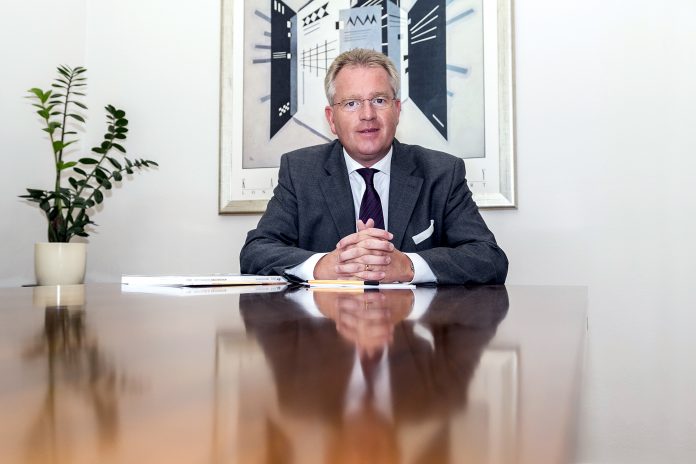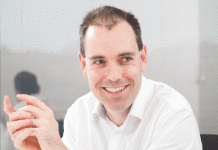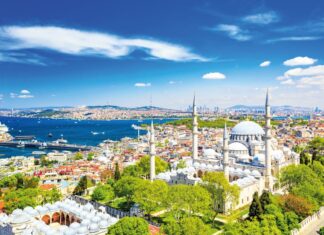You have been General Manager of the German Water Partnership (GWP) for one-and-a-half years. In what direction are you taking the GWP? What personal experience have you brought to the role?
I am trying to bring a greater level of professionalism to the association itself. My background is in computer science and physics and I did my PhD in mechanical engineering. I worked for many years in the IT field. I am also a partner of a consulting company in the area of new energy, infrastructure and IT systems. What I bring is the know-how from the IT side. Industry 4.0 is one of the key words, which we just turned into Water 4.0 [see box], which is an interesting topic here in Germany at the moment and besides my work and my own companies, I bring a lot of experience from honorary positions in politics and different associations.
Your experience falls mainly in engineering and business. Do you think in general the water sector needs to encompass more people from ‘outside the field’?
Yes, generally it is good to have a perspective from different points of view, including the economic side, the technical side, and the political side. Water is now a relevant topic especially with the new Sustainable Development Goals (SDGs) and generally it is a good idea to have viewpoints from a wide horizon.
What are the biggest challenges facing the sector?
In Germany itself, water is not a big topic. For example, if you go to the German Parliament there are only one or two people who care about the topic of water as we have nearly 100 percent of the population connected to drinking water and wastewater. Water is available 24 hours a day, seven days a week. What we can address here is that we have German technologies, which can solve a global problem to develop the economy further. Germany is an export nation, we export our products and goods so we should have a high interest in other countries’ progress, in particular developing or emerging countries, to open new markets to German industry. The infrastructure in those countries will become better as water and energy are the main things that you need to build up an infrastructure. You cannot run industry if you do not have water and energy.
Water is one of the biggest consumers of energy and we need to find more intelligent solutions, like using renewable energies and to think about producing energy from wastewater treatment plants and for them to become 100 percent energy autonomous.
Water is also a major component of infrastructure in big cities. I see when I travel that we need to export the infrastructure model that we have here in Germany–water and wastewater is only one part. This would be the best thing to do to help develop other countries and then you can build up any type of business on top.
Where does Germany lead the world?
I think in machinery, we have very special technologies, like membrane technologies and others. Currently in the industry, the digitalisation of the water sector through Water 4.0 is big. You will find very different business models in the future if you combine the different components of water solutions in a more clever way. Through energy efficiency and renewable energy, our experience with Energiewende [the transition from nuclear power generation and use of natural resources towards renewables] shows that we can bring this closer to water structures.
Is there growth in these areas from a technological and geographical aspect?
From the technology side there is a growth perspective and we have a group working on Water 4.0 systems, that are right at the beginning of this development and during IFAT [Trade Fair for Water, Sewage, Waste and Raw Materials Management, Munich, Germany, 30 May-3 June] we will publish information about what we have done up to this point. There is a growth perspective and–looking worldwide–we are at the beginning of the digitalisation process.
I was in Africa and also just returned from Southeast Asia, and you can see countries in those regions have a great demand to build infrastructure, yet all of the people there have at least one smartphone in their hands.
If you have an intelligent IT system, which guides you through those processes, it could be a major step forward from what we had 20 to 30 years ago and by putting an IT component on top it could be a ready solution for Africa. These countries don’t then have to go through all the same steps that we went through but only enough to ensure a robust system. So there is definitely an opportunity for growth there.
Geographically, Africa is very varied, we have members working in nearly all African countries but it is onaprojectbasissoitisnotasifwe focus just on Kenya or another country. There is however a greater focus on South Africa as it is relatively developed and in South East Asia we have some countries in the region where we focus such as Vietnam where we have our own office and the surrounding countries like Malaysia, Thailand, Cambodia, Laos and the Philippines. This is one hot spot. China is of course a focus but China is a separate country that has different problems and then we have the US, where we are talking more about digitalisation solutions from the US IT sector which is much more developed compared to Europe
How do you complement individual member company’s own marketing efforts, is there a common overall strategy?
We don’t promote individual companies but what we try to do is promote special solutions that German technologies can help with in different countries. That is what we do by holding conferences in those countries and travelling and visiting, and what I do is talk to governments and other representatives. I undertake tours and try to send experts to other countries to address certain topics through our members.
Sometimes we also play a part where we send some employees to do coordination work on those projects, but not in an operative or management placement, just to help facilitate networking and provide know-how.
How do you structure your partnerships between public, private and academia?
We have a lot of members that come from universities and research institutions and a working group on innovation and technology transfer. So we mix industry partners with research partners. We have consultants from technology companies, utilities, and operators. We have the full breadth of what you need to operate and plan water solutions.
What about finance and investment to develop the technology, do you work alongside financial institutions and also development banks when out in the field?
One of the roles that GWP has is to promote German technologies in the water sector to other countries. But to do this, those countries need to have the necessary money. That is the reason why we try and get in contact with all the international financial institutions to find out how we can invest in infrastructure and then Germany can deliver the technologies that are needed.
We have cooperation agreements with KfW [the German Development Bank] and also with GIZ, the German Development Cooperation. We regularly meet with people who are responsible for the different programmes of financing and development to find out what we can we do to support them to put together better tenders in different countries. If we are talking about competition in the water markets we try to find out what to bring in and which tenders to look for so that the right quality will be delivered.
Chinese companies often provide the cheapest solutions. But if you take a medium-term perspective and look at their products and the quality–and if you talk to the people who order such products–they find out that they are not working as they had been promised at the beginning. We try to provide that long lasting quality and bring in the development banks to make the initial offer to include the quality aspects in the agreement, not only the price but also the other components that should be delivered.
When I talk to ambassadors, for example from here in Berlin, they clearly address what they want to have, they want to have good technology, which must be robust and must work well over the long term. They sometimes are obliged to do tenders due to international laws and they have to buy products that they do not want to have. Our job is to talk to the development banks to ensure that the tenders promote the right quality and some of those come from Germany but also from other European countries and the US.
The make-up of GWP includes five German ministries, is that a help or hindrance, being beholden to so many different government departments?
It is a benefit. Sometimes the ministries communicate on specific topics through GWP so all of the ministries have their own focus. For example, in foreign affairs they are more focused on water problems and transboundary water issues. If you talk to our ministry
for economic affairs they are more focused on how we can promote German environmental technologies to boost business in other countries. If you talk to the ministry for the environment, they are more focused on the climate aspects–this is the ministry with which we have the most contact. The research ministry conducts projects and we work together to try and explore new markets for our products, and through our development ministry we try to bring everything together.
We are starting to build a closer relationship with the ministry of agriculture because irrigation is one of the biggest users of water and we are just beginning to find out what we can do together.
It is a benefit working with so many ministries, not a problem. We bring the different ministries together and sometimes that is our role. The head of one department sometimes calls us to find out what his counterpart at another department is doing!
Which countries do your biggest competitors come from?
In general France, companies like Veolia that want to build up complete water treatment plants. For components, China is the biggest competitor due to the cheap prices.
What strategies are you implementing to maintain the ‘made in Germany’ market share and brand? I think high quality German machinery is very robust and the “made in Germany” tag continues to sell itself.
In Germany, we have had very good infrastructure for 150 years and if we can export this to other countries, all the know-how, everything you need like education, to other countries then we are doing something good. We are also helping German industry and that is why it makes sense for me to work in this role.








